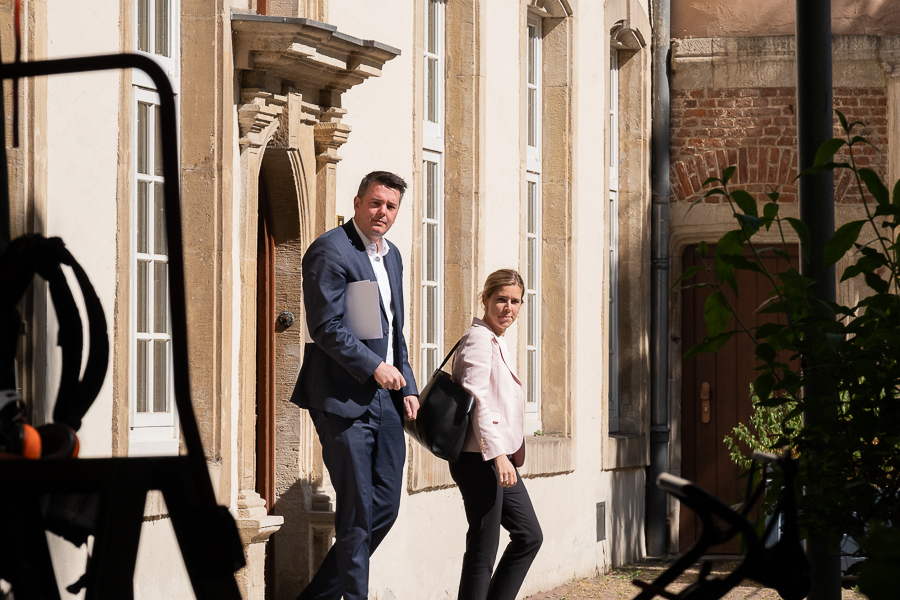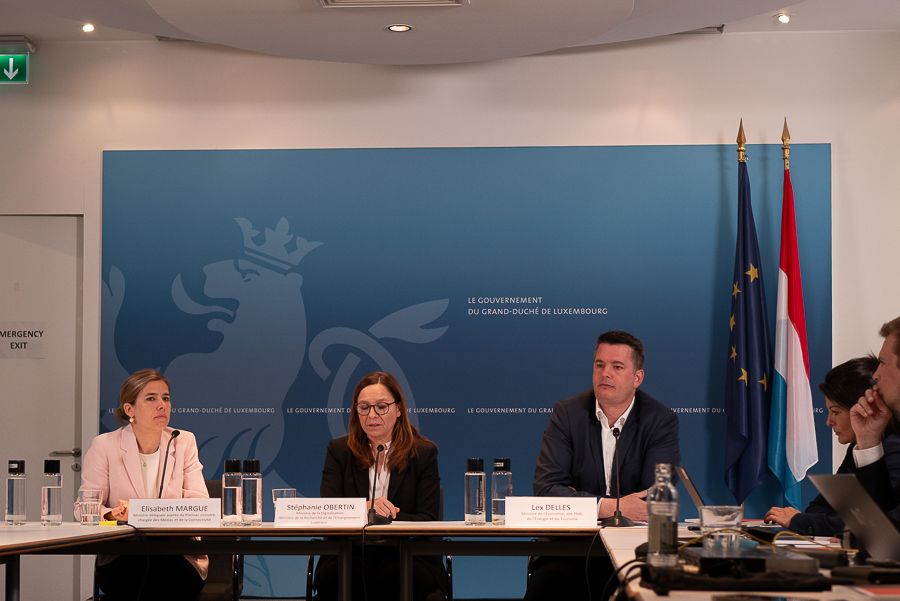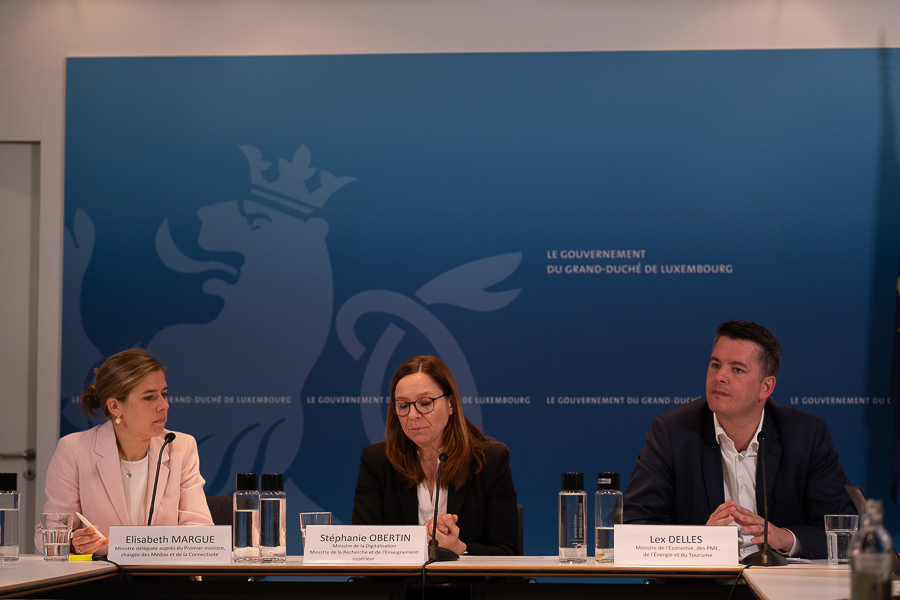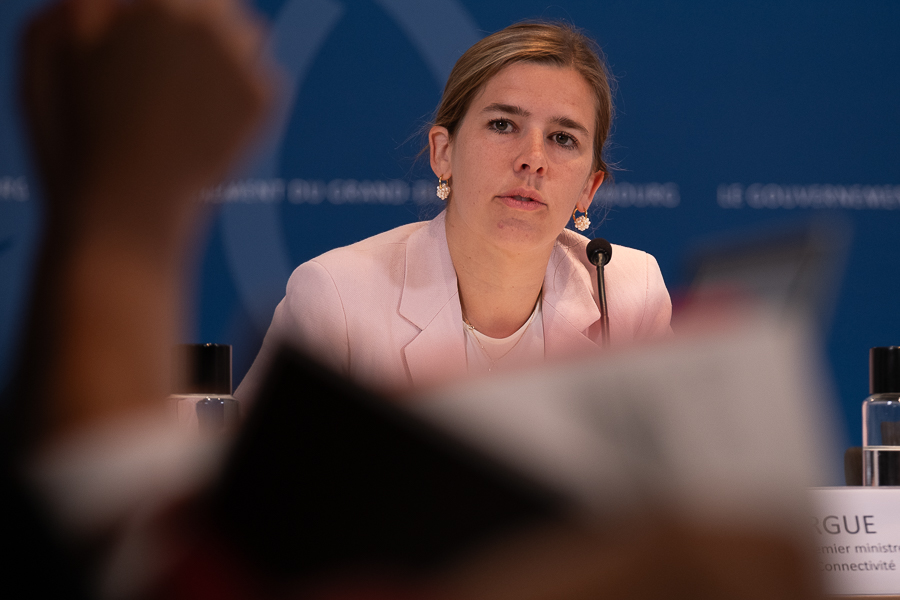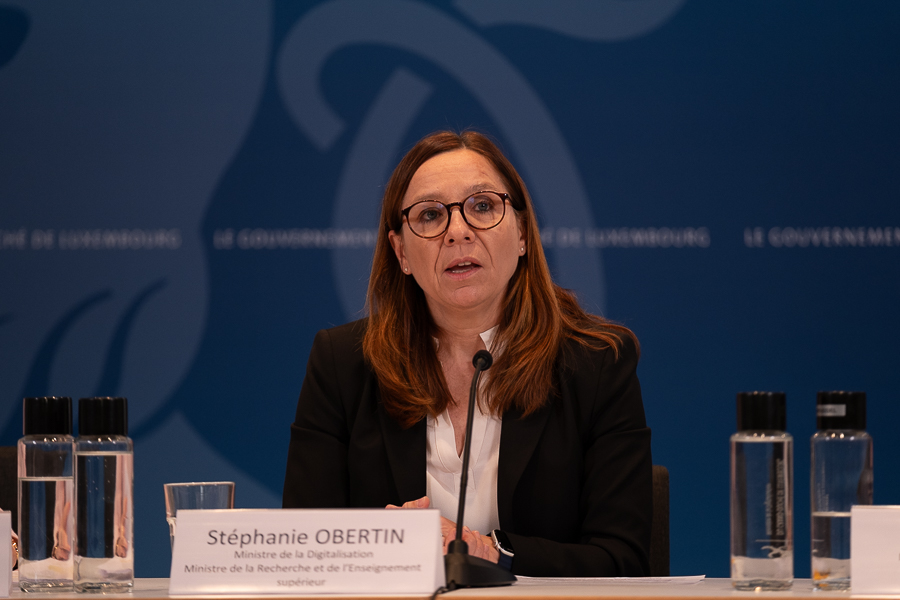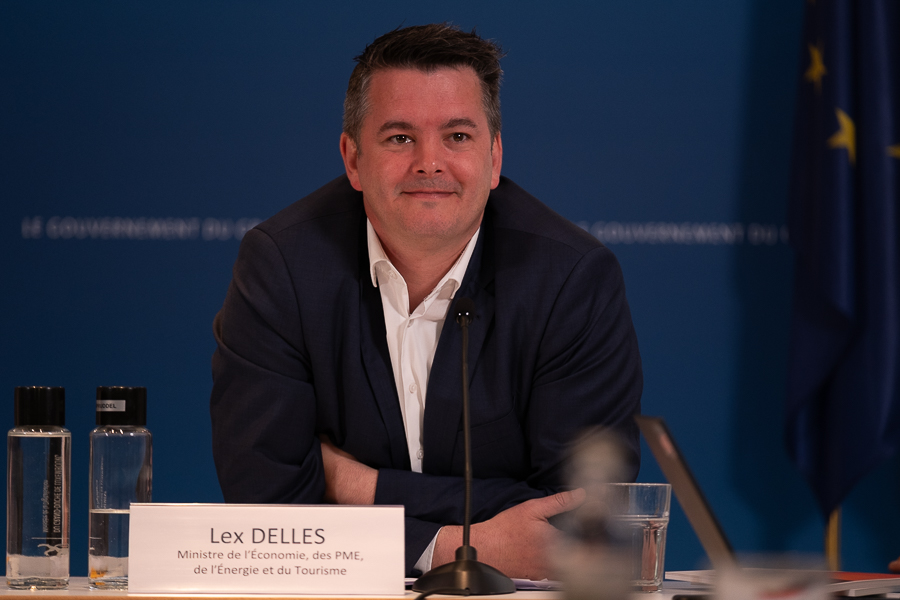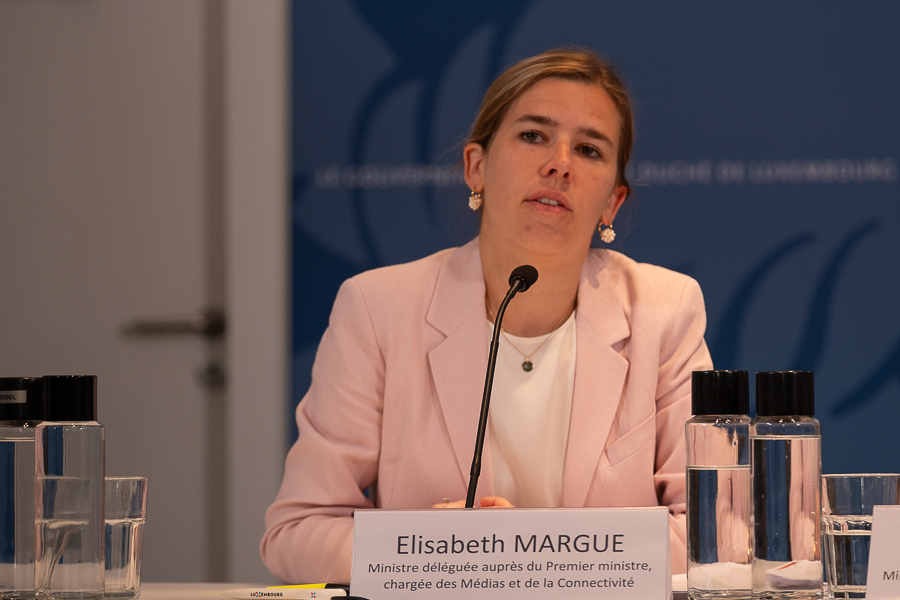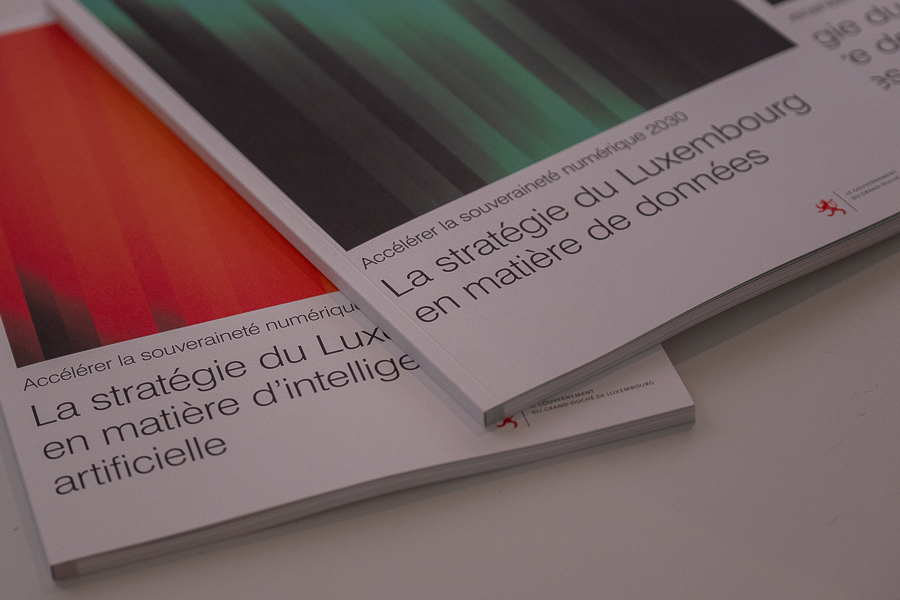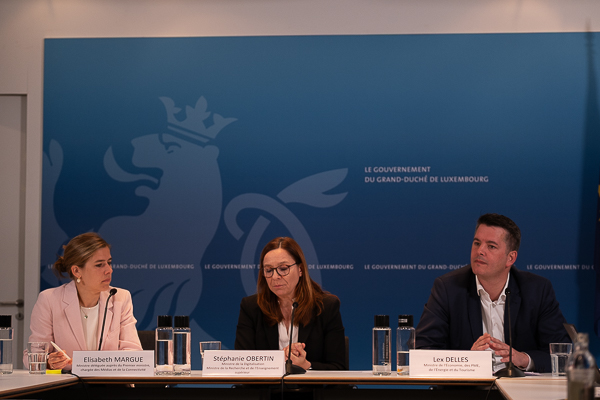 (L-R) Elisabeth Margue, Luxembourg's Minister Delegate to Prime Minister for Media & Connectivity; Stéphanie Obertin, Luxembourg's Minister for Digitalisation; Lex Delles, Luxembourg's Minister of Economy, SMEs, Energy & Tourism;
Credit: Ali Sahib, Chronicle.lu
(L-R) Elisabeth Margue, Luxembourg's Minister Delegate to Prime Minister for Media & Connectivity; Stéphanie Obertin, Luxembourg's Minister for Digitalisation; Lex Delles, Luxembourg's Minister of Economy, SMEs, Energy & Tourism;
Credit: Ali Sahib, Chronicle.lu
On Monday 19 May 2025, Luxembourg's Minister for Digitalisation, Stéphanie Obertin, Minister Delegate to the Prime Minister for Media and Connectivity, Elisabeth Margue, and Minister of the Economy, SMEs, Energy and Tourism, Lex Delles, presented the strategic initiative "Accelerating Digital Sovereignty 2030" at a press conference.
The respective ministries noted that, as part of the 2023-2028 coalition agreement, the government is committed to promoting innovation in order to sustainably position Luxembourg at the forefront of new technologies, particularly in the digital field. Data, artificial intelligence (AI) and quantum technology constitute the three strategic priorities that Luxembourg aims to develop through dedicated and aligned strategies.
Contributing to European strategic sovereignty
With the growing importance of data and its exploitation, as well as the rapid rise of new AI tools, the authorities deemed a review and adaptation of government strategies as essential. At the same time, another technological development is said to be progressing rapidly: quantum technology. The main objectives of the new initiative are continuing to boost the national economy, improving citizens' quality of life and contributing to strengthening European digital and strategic sovereignty.
The government has opted for a whole-of-government approach by coherently coordinating the various strategic cutting-edge technology initiatives, an approach that the authorities described as "virtually unique internationally". New dedicated budgetary resources will be mobilised between 2025 and 2030 to implement the investments and projects identified in the context of these three strategies.
Applying AI while respecting European values
Minister Margue opened the press conference by emphasising that the shared vision set out in these three strategies will ensure coherent and efficient action. The national AI strategy thus places a strong emphasis on the practical application and testing of AI. Reflecting the Draghi report, the strategy will initiate actions to increase the use of AI in various sectors and areas of society.
"It is the expertise of existing professions that must embrace AI to truly benefit from it. AI has left the laboratory and we must use it to understand its risks and, above all, its opportunities," Minister Margue stated. "As we implement the AI Act quickly and pragmatically, we are strengthening the European approach to AI, based on our values".
With the rapid operationalisation of regulatory sandboxes, the legal framework for AI reportedly supports innovation and guarantees the protection of European values, especially in high-risk use cases. The ministries added that, building on this trust, the strategy will support the AI ecosystem and democratic discourse by investing in the development of expertise among citizens and each AI practitioner. The strategic actions thus place a strong emphasis on AI training to strengthen the skills of citizens and increase AI literacy.
National Data Strategy
Minister Obertin presented the objectives for AI in the public sector, the national data strategy and the implications of the government's strategic initiatives for public research. According to the minister, technological innovation must be encouraged in a responsible and transparent manner, and the integration of AI in the public sector will not only improve the performance and accessibility of public services, but also the quality of life of citizens. To this end, the Government IT Centre (CTIE) is developing an AI competence centre to support the technological needs and demands of government agencies.
Regarding the data strategy, Minister Obertin stated that it is a fundamental basis for positioning Luxembourg as a centre of excellence for data. One of the ambitions of the national data strategy to be highlighted is centralised governance. The centralised approach is described as unique and simplifies coordination between entities regarding data access and reuse. Through this governance, Luxembourg aims to ensure the valorisation of data, while ensuring data protection and privacy, and thus preserving citizens' trust.
Through Bill 8395, the government reportedly aims to equip itself with a transparent and efficient infrastructure and a legal framework enabling data sharing between public institutions, the private sector and civil society. This is said to foster cooperation and innovation and to enable the development of common solutions to address the social and technological challenges of tomorrow.
Minister Obertin stated: "We want to achieve this through more centralised governance, reliable and interoperable infrastructures and strong participation in European initiatives, such as the [Common] European Data Spaces. The national data strategy is a fundamental basis for accelerating digital sovereignty, which will enable Luxembourg to maintain control of its data, manage it responsibly, and optimise its use." She added that "this will ensure citizens' privacy and data security, promote national innovation and build a robust and more sovereign digital economy. Digital sovereignty strengthens Luxembourg's ability to meet future technological challenges while bringing benefits to society".
"The strategies presented also provide a coherent basis for specifically directing research and innovation in Luxembourg towards key future technologies," the minister noted, adding that the authorities will review and adapt the national research and innovation strategy in the short term based on the data, AI and quantum technology strategies. "Our objective is to promote data-driven and trustworthy research, based on transparent, auditable and regulatory-viable technological systems in an international context. In doing so, we not only strengthen the excellence and resilience of our scientific landscape, but also position Luxembourg as a committed player in research in the digital age".
Making Luxembourg a pioneer in quantum technology
Minister Delles subsequently provided an update on the economic impact of the initiative, before unveiling the first national strategy dedicated to quantum technology. This still-emerging field is believed to represent a major driver of transformation. Its potential goes beyond computing performance, with applications in cybersecurity, logistics, finance and research. The minister noted that Luxembourg has chosen to anticipate these developments and assert itself as a committed player at the European level.
The quantum technology strategy is based on three complementary objectives. First, it aims to create economic value by transforming cutting-edge research into high-value-added applications; Luxembourg intends in particular to support the development of new quantum processors based on semiconductors, while leveraging advances in quantum communication and computing, in close collaboration with research centres and the industrial sector. Initiatives will encourage the experimentation of use cases, the creation of startups and spin-off projects stemming from public research.
It also aims to structure an innovation ecosystem for quantum technology by mobilising public, private and academic stakeholders. The authorities added that the installation of the MeluXina-Q quantum computer in Bissen, a member of the EuroHPC network, will play a central role in developing the skills needed to adopt quantum computing. University partnerships and training programmes (ranging from summer schools to training courses for technicians and engineers) will reportedly equip the country with the talent needed to understand, master and advance these technologies.
Moreover, the strategy aims to strengthen security in a post-quantum world by anticipating threats to current cryptographic systems. Luxembourg will invest in post-quantum cryptography and develop a national testbed for quantum key distribution (QKD) to secure communications between sensitive institutions, critical infrastructures and government departments, in line with the European Quantum Communication Infrastructure (EuroQCI) initiative.
Minister Delles stated: "With our joint strategic initiative focused on data, artificial intelligence and quantum technologies, we are setting out a clear ambition: to make Luxembourg a pioneer in sovereign digital transformation. We don't simply want to keep up with major global technological developments - we want to anticipate, shape and master them. Our joint strategic initiative aims to empower all our companies - large and small - to integrate these technologies to improve their productivity, develop new services or optimise their production. Flagship projects such as the use of artificial intelligence for real-time management of the energy grid or to improve climate predictions are concrete examples. The quantum strategy marks a new stage in Luxembourg's technological transformation. We want Luxembourg to be not only a user, but also an innovative player in this field."
The three strategies are available on the government.lu website.

